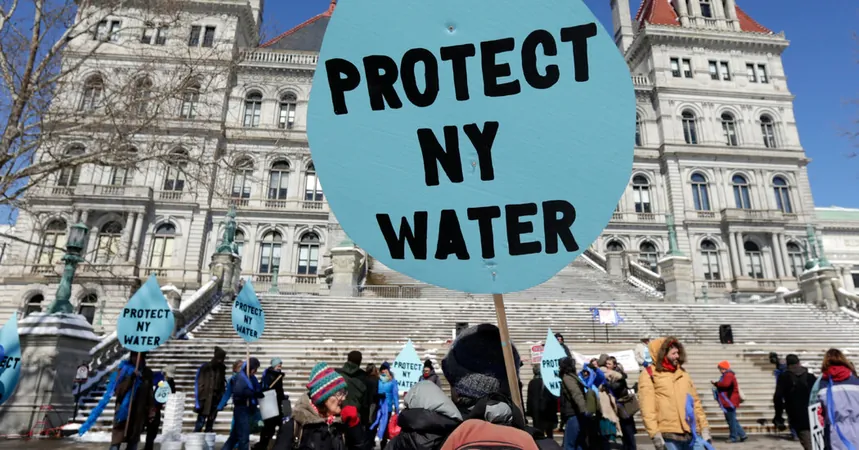
Massive Natural Gas Pipeline Plans Are Back on the Table in New York!
2025-05-29
Author: Jessica Wong
Williams Companies Seizes New Opportunity
In a dramatic turn of events, Williams Companies is reviving plans for two natural gas pipelines set to enter New York State. This bold move signals a strategic bet on the Trump administration's influence over energy project approvals despite New York's previous rejections due to environmental concerns.
The Political Climate Shift
The decision aligns with recent actions by the Trump administration, which has shown a newfound willingness to champion energy infrastructure. Just last week, they lifted opposition to the Empire Wind project after intense lobbying by Governor Kathy Hochul. As discussions unfolded, Governor Hochul hinted at collaboration on energy initiatives, especially those that could promise economic relief.
Understanding the Pipeline Plans
The proposed Constitution pipeline aims to transport natural gas over 100 miles from Northeast Pennsylvania to Albany, while the Northeast Supply Enhancement project plans to run primarily underwater from New Jersey to New York City. Williams is ramping up talks with state officials as it takes steps to restore permitting with the Federal Energy Regulatory Commission, targeting a pipeline activation by late 2027.
Facing Environmental Opposition
Despite the optimism from Williams, environmentalist groups and political figures oppose the pipelines, arguing they could hinder New York's climate goals and intensify reliance on fossil fuels. Governor Hochul acknowledged the potential benefits of lowering energy costs but emphasized the necessity of adherence to environmental standards. As energy prices soar, the tension between economic needs and environmental responsibility continues to escalate.
A Battle Over Energy Solutions
New York and New England's shifting energy landscape has them leaning heavily on natural gas, especially as coal-fired plants face closure. High natural gas and electricity prices are driving conversations around additional pipeline infrastructure. According to analysts, expanding pipelines could slash gas prices in the Northeast by 20 to 30 percent during peak demand seasons.
The Complex Climate Debate
While some studies suggest increasing gas supply might reduce emissions in the short term, many experts caution that an abundance of cheap gas could dissuade investments in renewable energy solutions in the long run. Governor Hochul's predecessors had already opposed pipeline projects citing potential water pollution and greenhouse gas emissions.
Political Stakes for Hochul
As Hochul gears up for her re-election campaign next year, potential pipeline developments could be crucial for her political standing. Amidst rising costs of living, her administration is pushing for tax relief and questioning utility rate increases. However, dissenting voices like Assemblywoman Anna Kelles criticize pipeline strategies, advocating instead for stricter caps on utility bills and enhanced energy efficiency measures.
Looking Ahead: The Future of Gas Pipelines
Even with regulatory hurdles easing, these pipeline projects face significant challenges. Securing long-term contracts and financing for the estimated $1 billion projects remains uncertain amid lofty fossil fuel reduction goals. Observers note demand for natural gas is expected to remain strong while local opposition and environmental concerns loom large, suggesting a rocky road ahead for these renewed pipeline initiatives.


 Brasil (PT)
Brasil (PT)
 Canada (EN)
Canada (EN)
 Chile (ES)
Chile (ES)
 Česko (CS)
Česko (CS)
 대한민국 (KO)
대한민국 (KO)
 España (ES)
España (ES)
 France (FR)
France (FR)
 Hong Kong (EN)
Hong Kong (EN)
 Italia (IT)
Italia (IT)
 日本 (JA)
日本 (JA)
 Magyarország (HU)
Magyarország (HU)
 Norge (NO)
Norge (NO)
 Polska (PL)
Polska (PL)
 Schweiz (DE)
Schweiz (DE)
 Singapore (EN)
Singapore (EN)
 Sverige (SV)
Sverige (SV)
 Suomi (FI)
Suomi (FI)
 Türkiye (TR)
Türkiye (TR)
 الإمارات العربية المتحدة (AR)
الإمارات العربية المتحدة (AR)